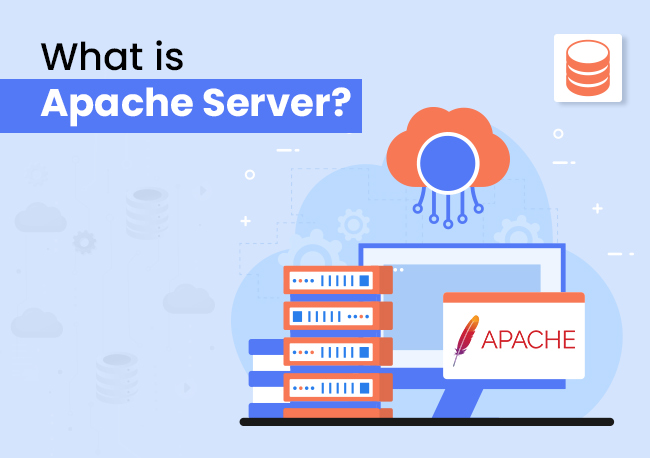If you are a tech geek, you would certainly know that websites on the internet are hosted through a robust and reliable server to offer an optimal user experience.
While there are numerous servers to choose from, one server that has always been the talk of the town and the top pick among website owners is Apache.
We are sure that your head is flooded with questions right now, like what is the Apache server, why webmasters are inclined toward it, how it works, what are its pros and cons, and so many more.
But hey, stop right there! Read this write-up, and by the end of it, you will have all your answers.
What is Web Server?
Web server refers to software reciprocating HTTP requests sent by web users. The main purpose of using a web server is to host websites on the internet and exhibit the content, visuals, and other elements of a website or page to the users.
Besides the above usage, web servers are also utilized for storing information and website elements, such as HTML documents, images, CSS and JS files, etc.
Generally, web servers process on dedicated devices or server hardware integrated with the latest softwares like Ngnix, Microsoft IIS, and the one this blog is about — Apache.
Also Read: Get To Know About A Web Server & Types Of Web Server
What is an Apache?
As previously mentioned, Apache is a web server allowing websites to display content, visual elements, and other components to the user upon sending an HTTP request.
To give you an overview, Apache was first developed in 1995 as a free and open-source web server by the Apache Software Foundation.
Besides being a cross-platform server, Apache is a widely preferred software among website owners for its robustness, versatility, and a suite of features, including modular architecture and extensive support.
Also Read: What Is A Website Name?
Why Apache Is A Popular Choice?
1. Open Source Server
One of the main reasons raising the popularity of Apache is the accessibility of the source code. Simply explaining the source code of Apache is free, allowing server users and developers to modify and extend the capabilities according to their needs.
This is not only a cost-effective solution but also helps the server users and developers to identify & fix bugs and contribute improvements.
2. Reliable Solution
From Slack to LinkedIn and Netflix to Airbnb, almost everyone uses Apache, and the reason is reliability. Apache has been in the market for more than two decades, and throughout this period, it has undergone numerous upgrades to enhance the user experience.
The improvements have transformed into a one-of-a-kind, powerful, and reliable server, adaptable to any environment.
Also Read: How Can You Make A Website Look More Professional?
3. Community & Support
Another perk of Apache is constant community support. The server has a diverse and active range of communities comprising developers, experts in the field, and Apache users, sharing their ideas and knowledge for enhancing the server.
You can access forums, join groups, and mail relevant resources to seek their guidance and advice on the topic.
4. Flexibility
One of the amazing benefits of using Apache is that users and developers can seamlessly customize it according to their requirements since it is flexible and extensible software.
Its architecture allows you to easily integrate additional components and extensions, such as API, softwares, features, etc., without manipulating the heart of the server.
5. Unparallel Performance
Apache is known for its ability to manage high loads while ensuring unbeatable performance. Meaning every time there is an incoming request, it will efficiently split the data into available resources to strike a balance and enhance the performance & overall output.
You can even add more machines and nodes when there is a requirement to increase the storage capacity.
Also Read: Website Optimization Tips To Increase Website Performance
6. Effortless Setup
The setup process of Apache is a piece of cake, even for non-technical users. All you need to do is download the compatible and latest version of the server from the official website. Once you download the server, run the installer or package manager command to execute the process.
That’s it! You are now all set.
You can customize the listening port, the document in the root directory, and so on, and start using Apache.
Like WordPress, this one, too, has minimal code usage. Furthermore, additional features, modules, and other enhancements can also be implemented to improve performance and usability.
Also Read: Types Of Virtualization In Cloud Computing-Complete Overview
How Apache Works?
As previously discussed, the primary function of Apache is to showcase content and other elements of a website/webpage. While everyone is familiar with the surface level, very few are aware of what goes behind the process.
Let’s understand that!
Apache works on the HTTPS protocol, ensuring secure and uninterrupted communication between the client and server. Supposedly, a user has landed on the home page of your website. As soon as Apache receives a request from the client side, it gradually and chronologically exhibits the text, images, videos, and so on to the user.
Apart from content and visual delivery, Apache offers numerous other features, including server control & customization, maintaining access logs, and more which we will be underlining in our next section — Features of Apache.
Features of Apache
- Processing of static files
- Seamless runtime of modules
- Auto-indexing
- .htaccess
- IPv6 compatibility
- Supports HTTP/2
- FTP connections
- Gzip compression and decompression
- Bandwidth limitation
- Perl, PHP, and Lua scripts
- Logging and tracking
- URL rewriting
- Geolocation
- Proxy and load balancing
- Performance optimization
- Highly configurable and scalable
Since you are acquainted with what does Apache do and how it works, Let’s jump to listing the pros and cons of Apache.
★ Pros and Cons of Apache
Pros
- Open source and free.
- Wide range of modules.
- Virtual and shared hosting capabilities.
- Highly configurable and customizable.
- Swift performance.
- Seamless management of large files.
- Compatible with various frameworks and CMS platforms, including PHP, Perl, WordPress, Joomla, etc.
- Easy to use even for non-technical users.
- Cross-platform compatibility.
- Extensive community support.
- Timely updates.
Cons
- Might face performance issues on heavy websites.
- Frequent modifications can result in website vulnerability.
- Installing new features or periodic customization can cause bugs and errors.
This was all about the pros and cons of Apache. We will now showcase the alternatives to Apache.
Also Read: 4 Types Of Desktop Virtualization – A Comprehensive Guide
10 Best Alternatives to Apache
We understand that Apache might not only be the choice of users. Individuals might look for alternatives with similar features offering flawless performance. That’s why we have listed down the 10 most popular alternatives to Apache.
- Nginx
- Apache Tomcat
- Node.js
- Lighttpd
- Cherokee
- Microsoft IIS
- Appweb
- Hiawatha
- Caddy
- LiteSpeed Web Server
So far, we walked you through the features and pros & cons of Apache. The next pointer is for developers and users who want to find out what web server a website uses.
Also Read: Strategies For Implementing DevOps Practices With AWS
How to Determine Which Web Server a Website is Using?
The most common and sure-shot way to identify the web server used by a website is through tools. Online tools are the most reliable solution that takes a quick scan of a website and highlights the information you need, which in this case is the identification of the web server.
Numerous tools can be used to specify the web server. However, we recommend you go for WhatWeb, Netcraft, or BuiltWith. These tools are not only popular and accurate but also quick, which merely takes a few seconds to show results.
All you have to do is visit their official website.
Add the URL of the desired website, and tap on the search.
Boom!
You have your results.
Also Read: 5 Best Website CMS Detector Tools You Must Try
Frequently Asked Questions
Yes! Apache is a free and open-source server.
On 2023-04-06, the Apache Software Foundation and the Apache HTTP Server Project released the latest version of Apache, which is 2.4.57.
➔ Operating system: CentOS/RHEL 7.2+ or Ubuntu 16.04(.2) or higher.
➔ Processor: 64-bit x86 CPU (more cores results in better performance)
➔ Storage: 4 GB of memory.
➔ 250 GB of local disk (more results in better capability; 500 GB recommended).
➔ Internet: At least 1 NIC.
➔ IP of your computer: Statically allocated IP address.
➔ Domain: Fully qualified domain name as returned by the hostname command.
Additional considerations:
➔ Must support HVM (Intel-VT or AMD-V enabled).
➔ If the deployment is on CloudStack, the hypervisor host must not have any VMs already running.
➔ All hosts within a cluster must be homogeneous.
➔ The CPUs must be of the same type, count, and feature flags.
Yes! Apache is compatible with almost every OS and ensures seamless performance.
Other web servers, which we recommended earlier, share similar performance, features, community support, reliability, speed, efficiency, etc., making them an ideal alternative to Apache.
Every server has its strengths and weaknesses.
However, the choice will directly correlate with your requirements.
Website owners, educational institutions, web hosting providers, government agencies, and developers use Apache for their websites.
Conclusion
We hope this write-up helped you gauge the nitty-gritty of Apache Server. If you are still wondering whether this server is the right choice for your website, we recommend you compare your requirements with the specifications of Apache.
As long as the specifications match your expectations, Apache is a great option. In case they don’t, other alternatives are always available for you.




